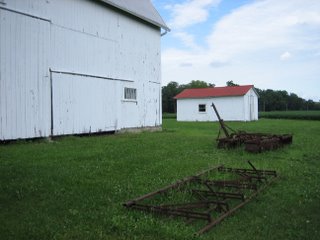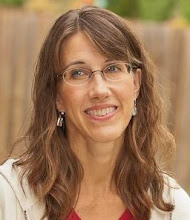
Part One
Part Two
When William proposed, he asked, "Do you love me enough to marry me?...But when could it ever be?" He had gone into debt for farm equipment, and he told her they wouldn't be able to take a trip. But my grandma didn't care. She told him she wanted to marry him before he turned 30! They were married in March, on her birthday, and they spent the first six weeks of their married life living with Aunt Edith (Grandma Mary Anne had died) and fixing up the house that William had been born in, where tenants had been living. After they moved in, they had someone over for Sunday dinner every week for a year. "So many people had been so good to us," Grandma said.
One of their Sunday afternoon guests was an old flame of Grandma's. Shortly before she met William, Vera had been sent by the church to a two-week Bible School at a nearby college, where she had met a nice young man. He wrote her letters for almost a year afterward, but her mother would never let her answer them. Later, after she was married, he came to the door one day. William ushered him in and left him there alone with Vera, making up an excuse to go out of the house. ("He never was jealous," Grandma would say when she told this story.) "I heard you were married," Bob said, "and I just wanted you to know that I knew and I'm very happy for you." They talked a little while longer, but before he left, he smiled and said, "I'd just like to know one thing. Why didn't you ever answer my letters?" ("He was such a nice boy," Grandma would sigh. "He married the girl that introduced us.")
Sometime in their early years of marriage, Vera's father asked William a theological question which prompted a greater interest in spiritual things. ("So are you a pre-millenialist or a post-millenialist [a hot topic of the day]?" "What do you mean?" "Do you believe the Lord will return before or after the millenium?" "I thought He already came once. I didn't know He was coming back again.")
William began to go hear various preachers and ministers whenever he could. One in particular brought such clarity that he became a fully-committed believer at that point. (Much later in his life, when I was a little girl, he asked to be re-baptized, as he felt he really wasn't a Christian when he had been baptized before. The Grandpa I knew read his Bible and wrote in a diary every day, and he always had a bookmark moving through a Christian book or study guide.) This preacher also suggested that believers should search their consciences about dancing and playing cards, and Grandpa felt that he and Vera should give these up, if she was willing. She went along with him, but I have often heard her speak wistfully of the fun they used to have with their bridge partners in those early years!
[An admittedly tangential--but cute!--story about Vera's parents in their courting days: Her mother was an identical twin. (Later on, she and her sister once won the title of Most Identical at a twin convention.) The two girls used to enjoy confusing the boys by switching dates all the time, until one night Vera's father said, "I don't know if you're Flora or Dora, but you're the one I like, and from now on, I don't want to go out with anyone else but you!"]
So William was now married to Vera when his twin, Richard, decided to sell out his share of the farm. William went to his father-in-law, a good businessman, and asked him what he thought they ought to do. William felt they were in no position to take on more debt, but "Pop" said, "Son, you can't afford not to." He helped them borrow the money--and they now had 200 acres to farm.
The Depression was on, and they were mortgaged to the hilt. Some land adjoining theirs came up for sale at just a few dollars an acre and they couldn't even think of buying it. Yet my grandmother remembers those years as the happiest of their lives. "Money has nothing to do with happiness," she would say. "We didn't have two nickels to rub together, but I never was so happy!"
The Final Part...tomorrow.

4 comments:
Loving this...
Have you come across Vinita Hampton Wright's novel "Dwelling Places"? It's a really interesitng book about what happens to one farm family when farming isnt possible anymore. I thought it was very realisitc and redemptive at the same time. Sheila Brennan actually has my copy right now, but if you're interested in it, you could borrow my copy from her.
http://www.amazon.com/gp/product/0060790806/sr=8-1/qid=1154379384/ref=pd_bbs_1/104-7474846-3668758?ie=UTF8
Ooopss...forgot to say this is Jen Roach from Seattle :-)
Another interesting resource related to this is PBS's documentary on the old farm houses of the midwest. "The Death of the Dream" traces what has happened to those homes. They have a web site with lots of info, but you might be able to catch the show on PBS or rent the DVD
http://www.pbs.org/ktca/farmhouses/index.html
Jen from Seattle
Post a Comment